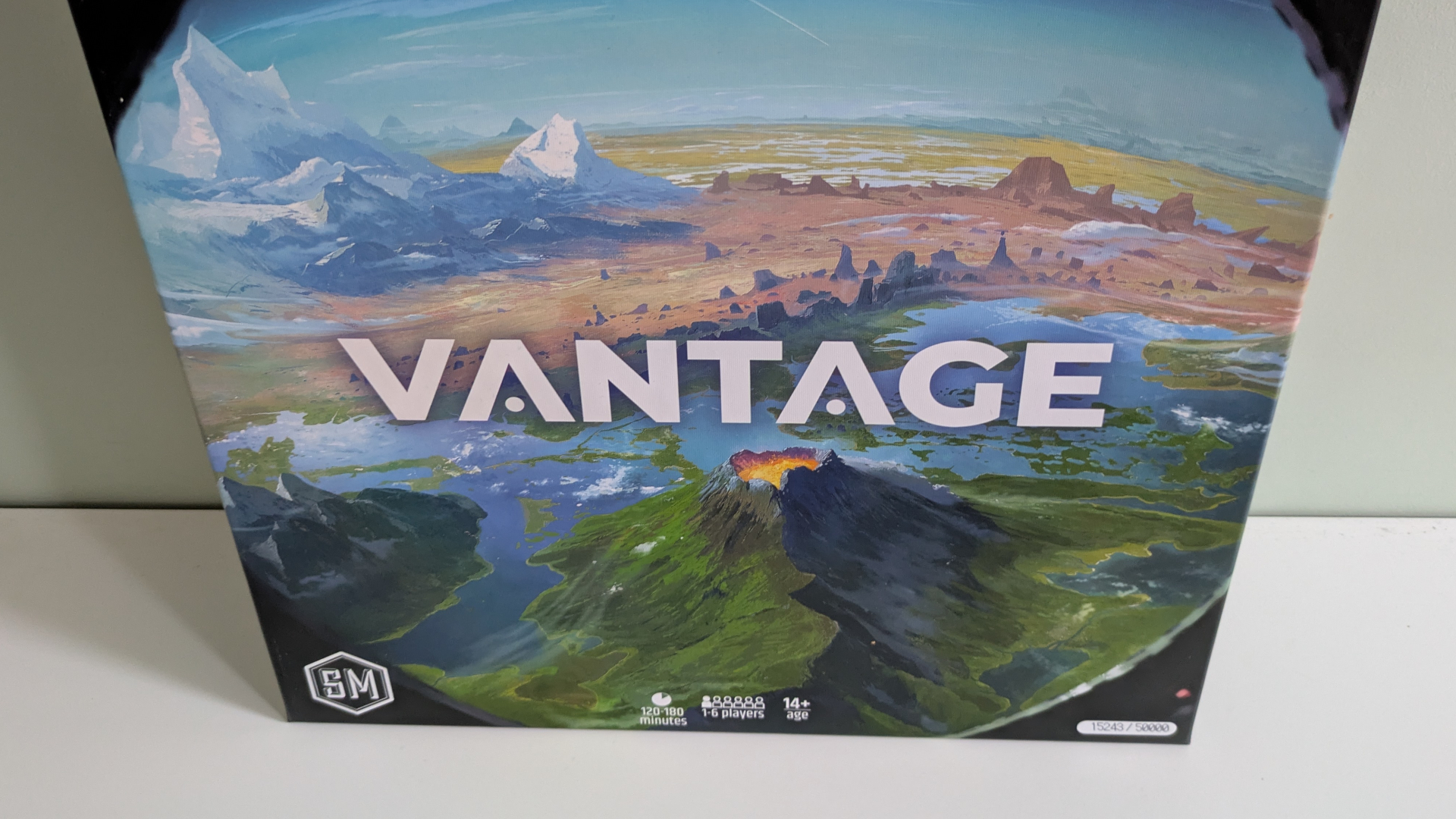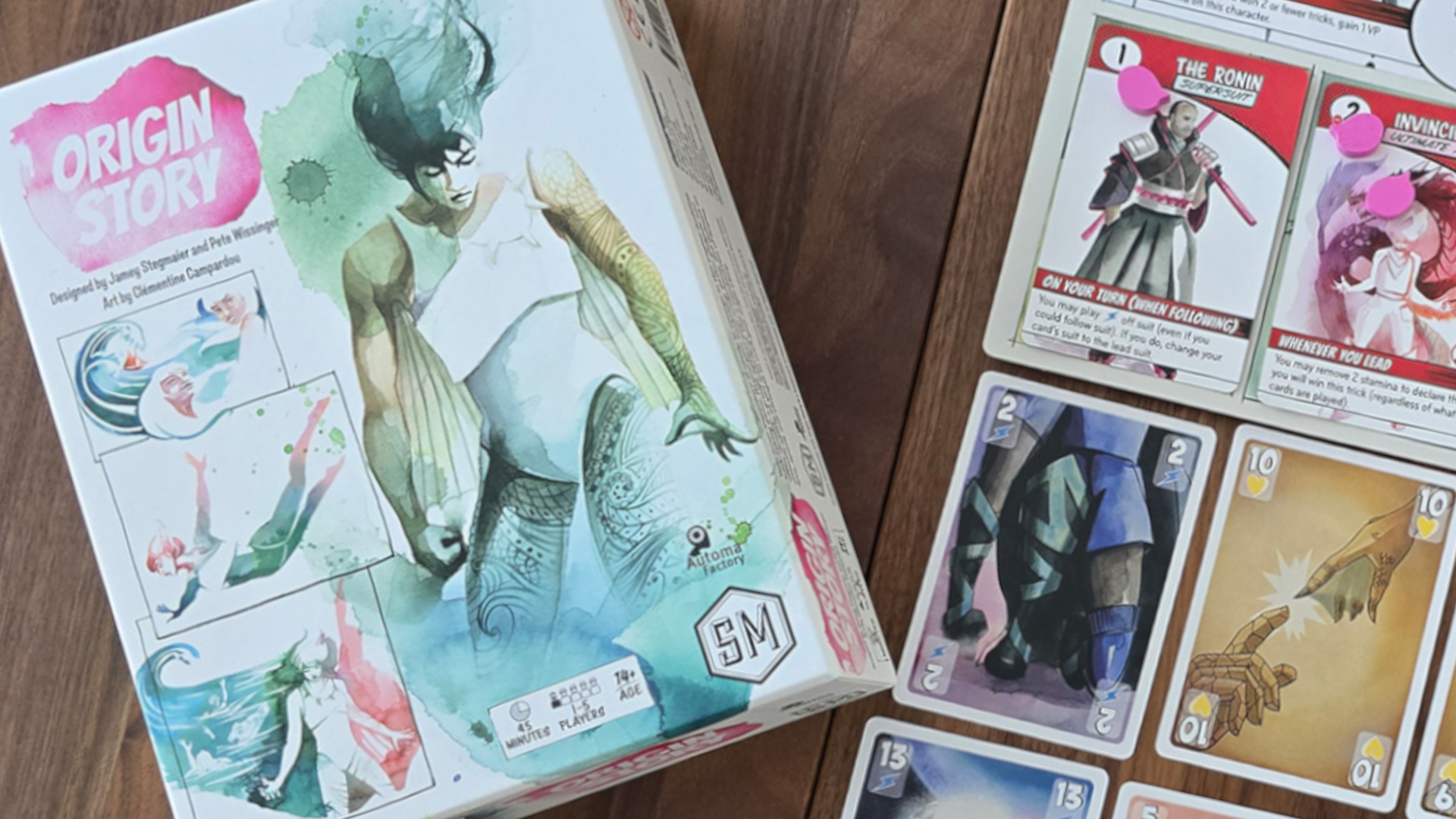GamesRadar+ Verdict
Vantage is an ambitious and successful sandbox design that demonstrates extraordinary creativity, but its open-ended, explorative focus won't be for everyone.
Pros
- +
Superbly well-realized alien planet for you to explore
- +
Full of novel design concepts to increase immersion
- +
Huge variety of things to do and find provide lots of replay potential
Cons
- -
Some players may find the sandbox too open and lacking in challenge
- -
Fiddly to administer and requires significant time commitment to get the most out of
Why you can trust GamesRadar+
Stonemaier Games is probably best known for its publication of Wingspan, one of the most acclaimed and best board games of all time. But its president, Jamey Stegmaier, is a very successful game designer in his own right, responsible for major hits like steampunk civilization game Scythe. Over the past eight years he’s been slowly building up his latest creation, Vantage, in which players explore a mysterious extra-terrestrial world. Now, he’s finally ready to share it with his fellow earthlings.
Is Vantage an interstellar trip you should take, though?
Vantage features & design
Price | $90 / £79.99 |
Ages | 14+ |
Game type | Exploration / narrative / cooperative |
Players | 1 - 6 |
Lasts | 120 - 180mins |
Complexity | Moderate |
Designers | Jamey Stegmaier |
Publisher | Stonemaier Games |
Play if you enjoy | Pandemic, Horrified, Forbidden Island, Lord of the Rings: Duel for Middle-earth |
- Box contains mind-boggling quantities of beautifully illustrated cards
- Included divider makes it very easy to store & set up
- Lots of books containing text paragraphs that describe what happens during the game
In Vantage, everyone plays as crewmembers of an intergalactic vessel who have crash-landed far from one another on an unknown planet. Your job is to explore this vast new world, and support each other as best you can despite being separated by vast distances.
As such, Vantage comes in a sizable box. However, even its dimensions belie how heavy it is, weighing in at a whopping five kilos. The reason for this is that it’s absolutely packed with cards. There are more than four hundred large, tarot-sized cards that represent locations on the planet, and over 900 standard-size cards which stand in for the encounters you can have there, skills you can acquire, and items that you can find.
Both decks also have far more bizarre things in them other than locations, objects, or encounters, but saying any more risks spoilers.
Slowly learning more and more about the world you’re exploring is a key draw of playing Vantage, and so I'm going to do my best in this review not to give anything away. That obviously makes it a bit awkward to talk in detail about how the game plays or even what the components look like, so please bear with me as I flesh things out as best I can. Even the photos I've used to illustrate this article are bare bones so that we can preserve the surprises for those who want to play.
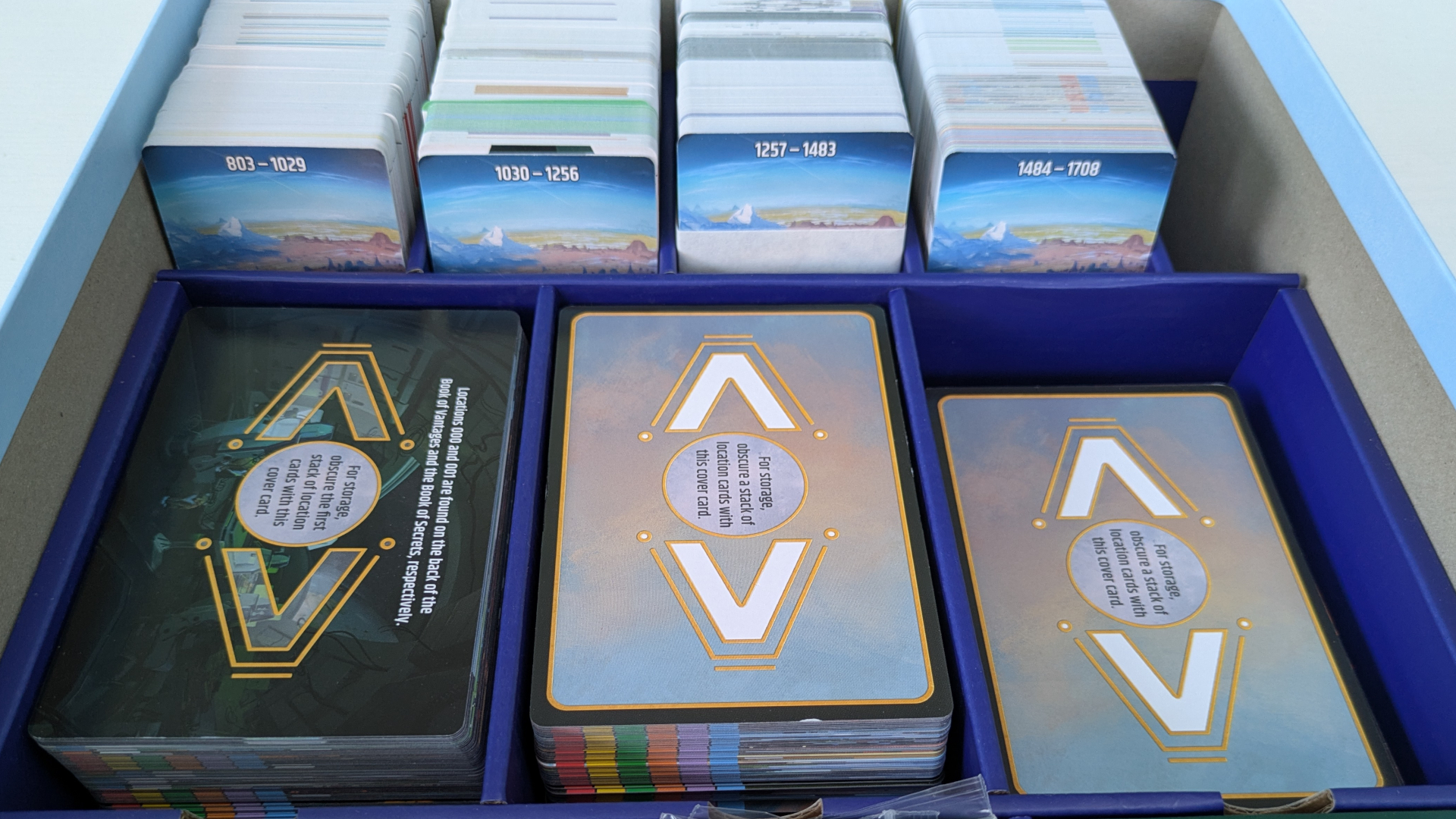
Given that three different artists have worked on the game, there’s a surprising and pleasing uniformity of style in the art which is clearly the result of a coherent, overarching vision of what the game should be and how it should look. There’s a lot of it - most cards are illustrated and those big location cards are particularly rich and detailed. It’s mostly a delight, doing a great job of bringing a virgin world to life before your eyes as you play.
Weekly digests, tales from the communities you love, and more
Besides the cards, the other major weight comes from no less than nine different books of paragraphs and other supportive text that you’ll reference during play. These are lightweight and easy to pick up and flip through. There are two pools of custom dice, one black with white icons, and another white with coloured icons. Finally, there’s a sheet of punch out-tokens to represent money and skill icons. It’s worth noting that the box is very well divided and things pack away very neatly, making it easy to set up and start each new game.
Gameplay
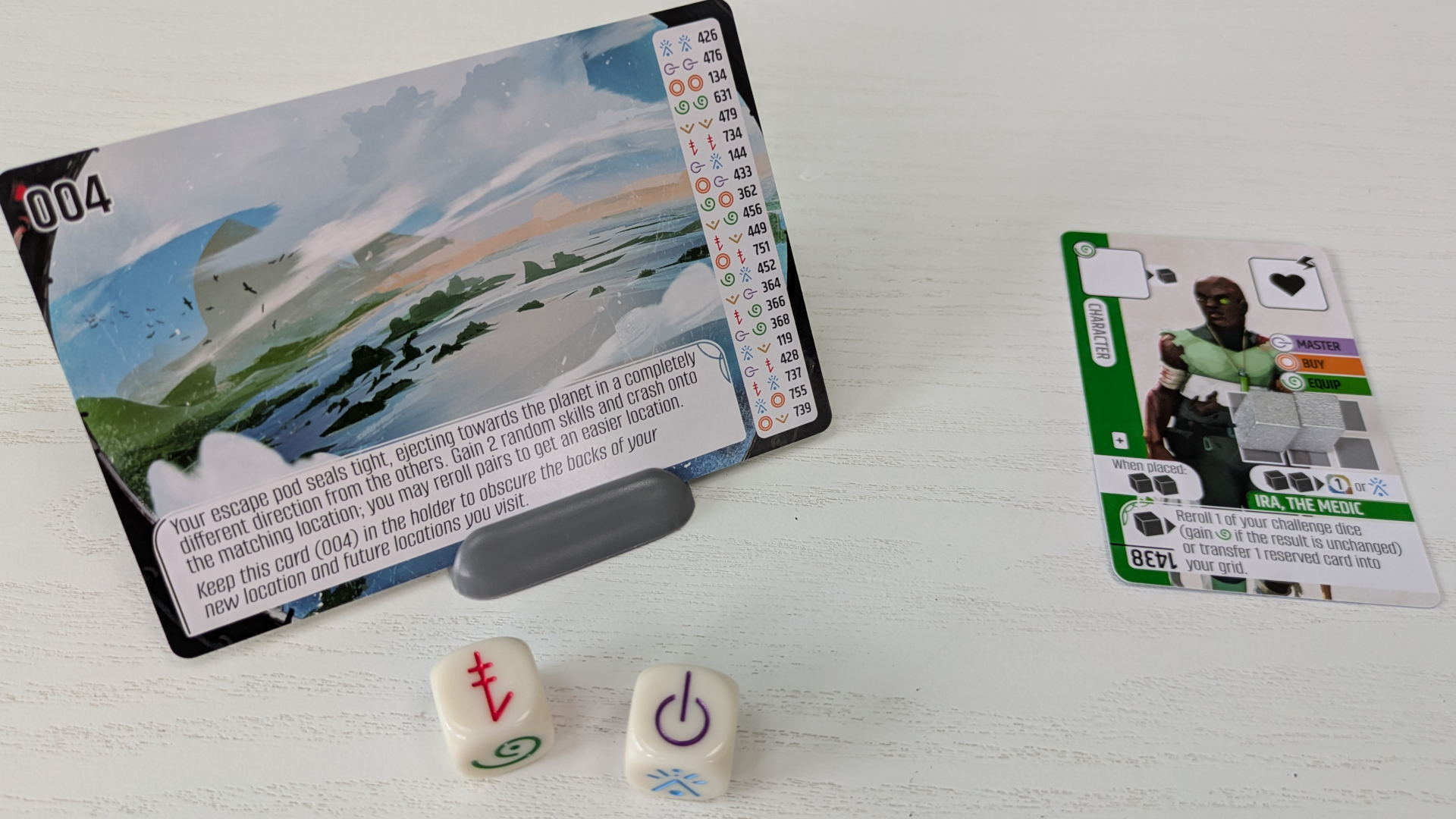
- Players are given a group goal & are scattered across an alien planet
- Every location & item has associated actions, which always succeed, but you can get hurt in the process
- As the game progresses, open-ended exploration can yield different goals & it's kind of up to you when you stop play
After setup, the first proper rule in the rulebook is labelled "the universal rule of thematic fun," which reads "if you are ever in doubt about a Vantage rule, card, ability, or anything else, choose the most fun answer that makes sense thematically." That tells you a lot about what kind of game this is going to be and, in some ways, serves as a mini-review in its own right. If you want a game that sets clear, hard boundaries to create a well-defined strategic challenge that you need to master, walk away now. Vantage is not for you.
Setup will see your group given a shared goal, then each player chooses a character from the crew of a malfunctioning starship, and those characters’ escape pods crash-land at random spots on an alien planet. These are represented by tarot-sized location cards which players place on a stand in front of them so that others cannot see it. Part of the game’s theme is that the players are in contact by radio but not visually, so if you want to tell the group where you are, you have to describe the image on your card rather than show it to them. This is, as it turns out, a powerful and imaginative tool for reinforcing the game’s immersion.
Also on your card is a description, a list of actions, and a set of four compass points. There are usually six actions, each of which is tied to one of the game’s six action categories, but it will be given a descriptive keyword to indicate, more specifically, how that particular category ties to that particular location. The "overpower" skill category, for instance, might turn into a "smash" action if there’s an object there, or a "duel" action if there’s a sentient alien being. This gives you a clue as to how choosing that action might pan out in that location, as can scanning the location image for relevant details.
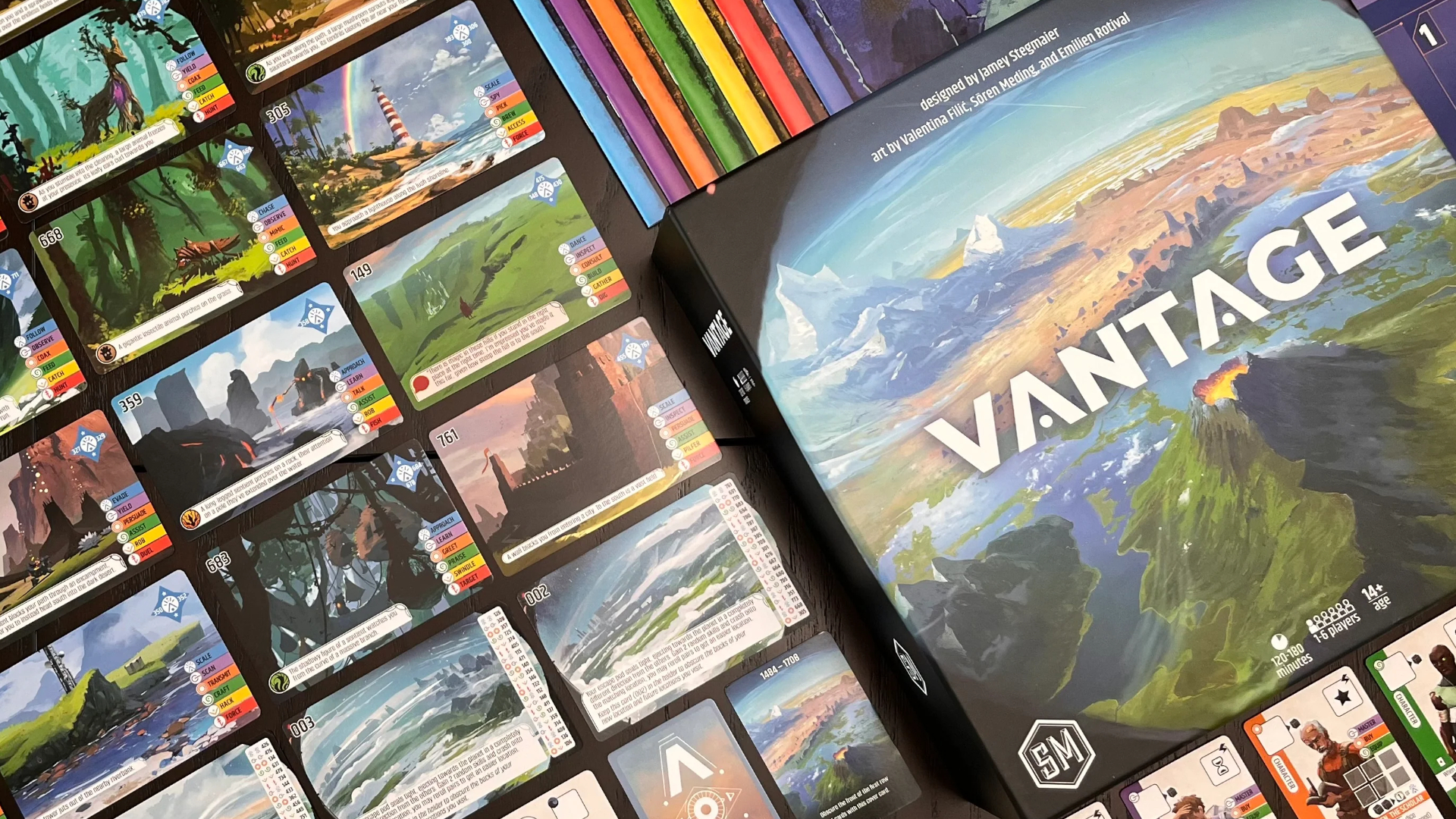
A lot of board games these days have an array of expansions or add-ons to work through but Vantage won't. It's described as self-contained, and the only available extras are premium components like metal coins.
While you’re at a location you can only ever take one of those six actions. After that you either need to leave (which is an action in itself) or take an action associated with an item or character card instead. This contrivance is mostly a minor irritation that’s necessary to maintain the game flow and to retain the replay value of a location should you encounter it again in later sessions. But it is unthematic, and in a game that’s based so heavily around trying to make the world you’re exploring feel as real as possible, some players may find that particularly bothersome. The game also involves quite a lot of card-searching and book-flipping, and although it is carefully designed to minimize this overhead, it can also interrupt your immersion.
Whatever you choose to do, all actions are handled in a broadly similar manner. You grab the book that matches the color of the action you’re taking and look up the card number. There you will find a difficulty number and a brief narrative outcome. Whatever action you're trying to take always succeeds, and the text reflects that. But the number indicates the amount of skill dice you need to roll, and these can reduce your health, morale, or time. Your character card, and the items and companions you’ll collect on your adventures, allow you to negate one or more negative results by storing them until the dice pool runs out, at which point all the dice are returned to play. But most cards will only store dice of a particular result, or a particular action type, making each roll something of a gamble.
What's also a gamble is the difficulty number and the exact outcome of your choice. You won’t know what these are until you’ve already picked your actions, although you can sometimes glean clues from the card associated with the action. This can make it frustratingly difficult to figure out how to achieve things in-game, including completing your goal. Worse, even though your action will succeed, it can lead to some nasty surprises if a player with low totals in one of the three trackable stats has to suddenly throw a fistful of dice in an unexpectedly harsh difficulty check. You can collect skill tokens to cash in and reduce the difficulty, but they’re not that easy to come by.
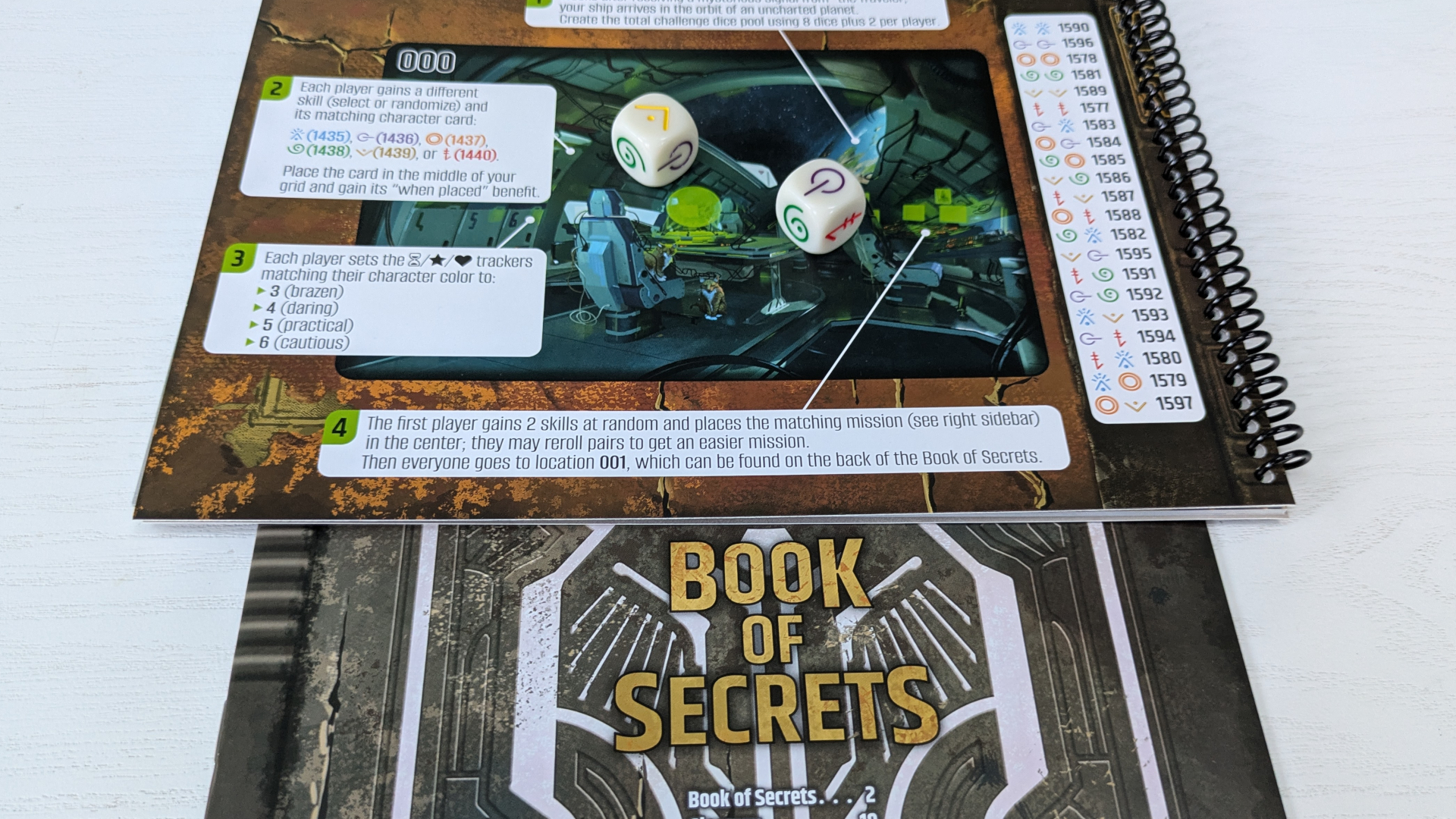
If Vantage was a game that was interested in demanding strategic conflict, not knowing how hard something is to achieve, or what exactly the outcome will be, before attempting it would be an obvious and awful flaw. But Vantage isn’t that kind of game at all. Rather, this is an extraordinarily rich and detailed sandbox for you to play about in. The layout of the world has been planned with meticulous care, allowing players to circumnavigate it if they wish, or to try and move around it and meet up from their scattered initial positions. There are amazing things hidden in the deck, secrets to find, sub-mechanisms to learn and master, and mysteries to uncover.
This amazing openness leaves it a group choice as to how you even call your session to a close. While you start with a collective goal, you will likely pick up other objectives, called destinies, along the way. Completing either will end your game, if you so wish. It's also quite common for individual players to decide on their own personal goals based on their encounters during the game. They may want to map an area, run a business, even settle down and get to know more about the locals. That all these things are feazible goals indicates the extraordinary breadth of the game's scope. These can sometimes clash: if a group hits a goal and wants to call it a night before one player is done with their own evening’s exploration, that can be a problem.
The game boldly leaves winning, losing, or even stopping as a player choice, leaving you always responsible for your final destiny however the winds of fate buffet you about
If this sounds vague, it is. The game is so unconcerned with what you define as "victory" and when you stop playing that even if one player runs out of time, health or morale, the indicated instructions allow you to gain some more and carry on. Vantage doesn't care, so long as you had fun. What it really wants you to do is re-assemble some other evening and play again. It's at pains to say it's not a campaign game – each individual session is a standalone story – but it also wants you to feed what you've learned about the planet and its mysteries into the next game and slowly, session by session, piece together the stupendously detailed and well-realized world that it represents.
Games that are primarily about exploration and experience are not new, but they've always been fairly niche. The problem, as seen in the likes of Tales of the Arabian Nights, which is essentially a colossal paragraph-based choose your own adventure book, is that they tend to feel random, chaotic, and overlong. Vantage, by contrast, rarely does. That's partly down to the always-succeed action system that leaves you feeling like the story is always moving forward. Partly it's down to the richness of its world. But mostly it's because of the way the game boldly leaves winning, losing, or even stopping as a player choice, leaving you always responsible for your final destiny however the winds of fate buffet you about. And in that, the game’s greatest weakness and most divisive aspect is also its greatest strength.
Should you buy Vantage?
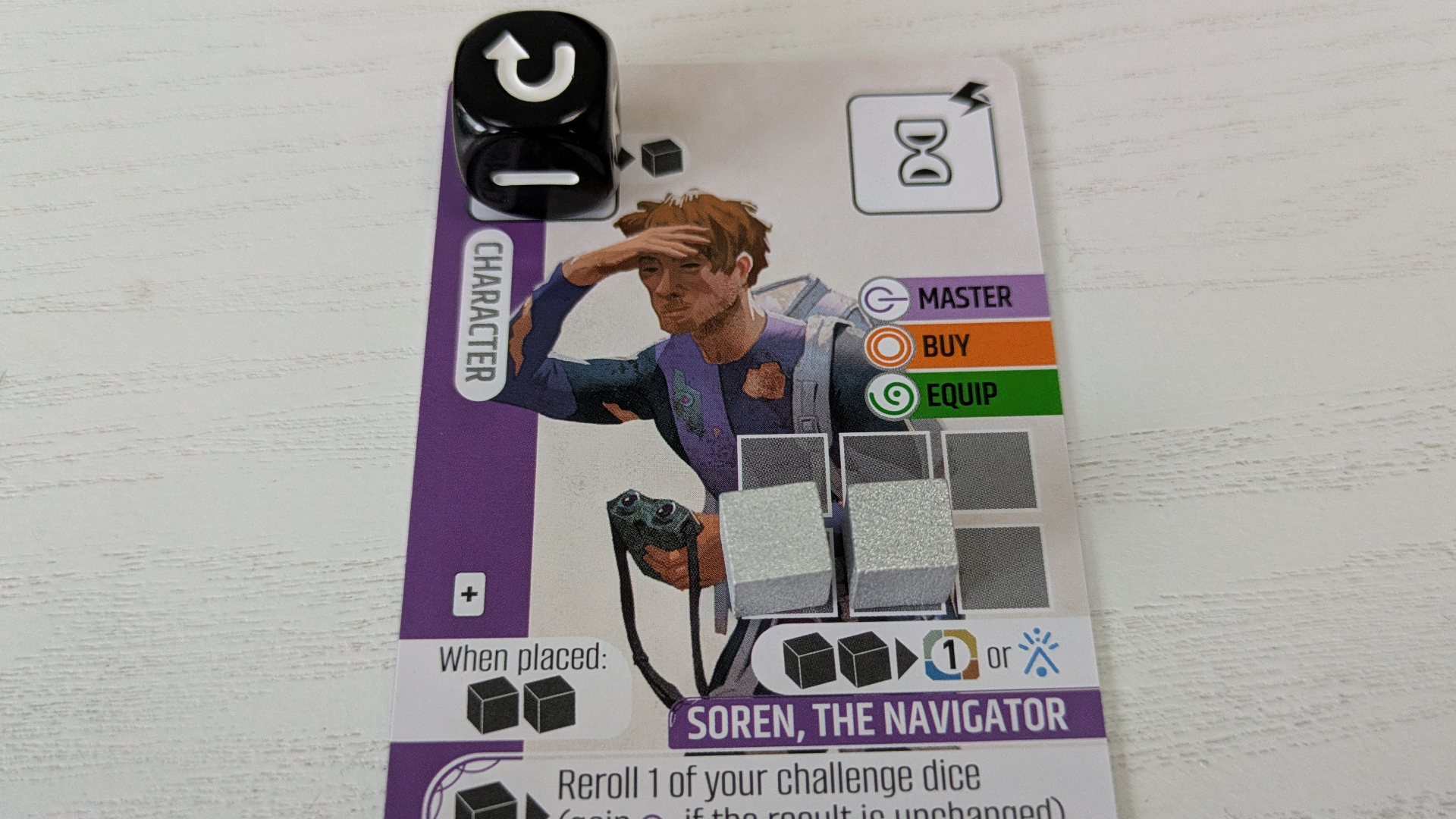
Vantage is a divisive game, which makes it hard to score, but relatively easy to make a purchase call on. There's no logical, strategic puzzle here to challenge you at all, and if that's the kind of game you want, it's a hard pass.
Even among storytelling games it's highly unusual. Most titles of this kind, including one of Vantage’s major inspirations, Sleeping Gods, set down a clear goal and a fairly constrained set of choices. Vantage, by contrast, is more of a sandbox. Not only is it probably the biggest sandbox board game ever designed, it is certainly the most cohesive and the most successful.
If you can cope with the concept of a game that has no real win condition, that's far more about exploration and experience than strategy and tactics, and that you're willing to put time, effort, and imagination into repeatedly probing, then Vantage is a unique adventure that you really should experience.
Ratings
Criteria | Notes | Score |
|---|---|---|
Game mechanics | Vantage’s systems are very novel, and ably provide plenty of excitement and surprises as you range across its setting. | 5/5 |
Accessibility | Vantage is moderately complex, and a little weird, which makes learning harder, plus it’s also a bit fiddly to administer. | 3/5 |
Replayability | The amount of content in this box is mind-boggling, and it’ll likely be a while before you even see the same location twice, let alone get the same results there. | 5/5 |
Setup and pack-down | This is a game made up of countless cards and tokens, so there's a lot to wrangle. | 3/5 |
Component quality | There’s very little in the box aside from cards, but they’re decent quality and rich with excellent artwork. | 4/5 |
Buy it if...
✅ You love exploration and narrative in board games
Vantage gives you a whole new world to investigate, coherently mapped and imagined, and the tools to make doing so enormous fun.
✅ You're thrilled by novel designs
A lot of board games are fairly similar once you scratch the surface, so if you're wanting something fresh and new, Vantage breaks the mould in multiple ways.
Don't buy it if...
❌ You want a challenging, interactive strategy game
Not only is there relatively little strategy to Vantage, the game is barely interested in setting you win or loss conditions: it just wants you to explore.
❌ You’re in the market for something fast and straightforward
Not only is Vantage a fairly long game, you'll need to play it repeatedly, investing imagination into every session, to get the most out of it.
How we tested Vantage
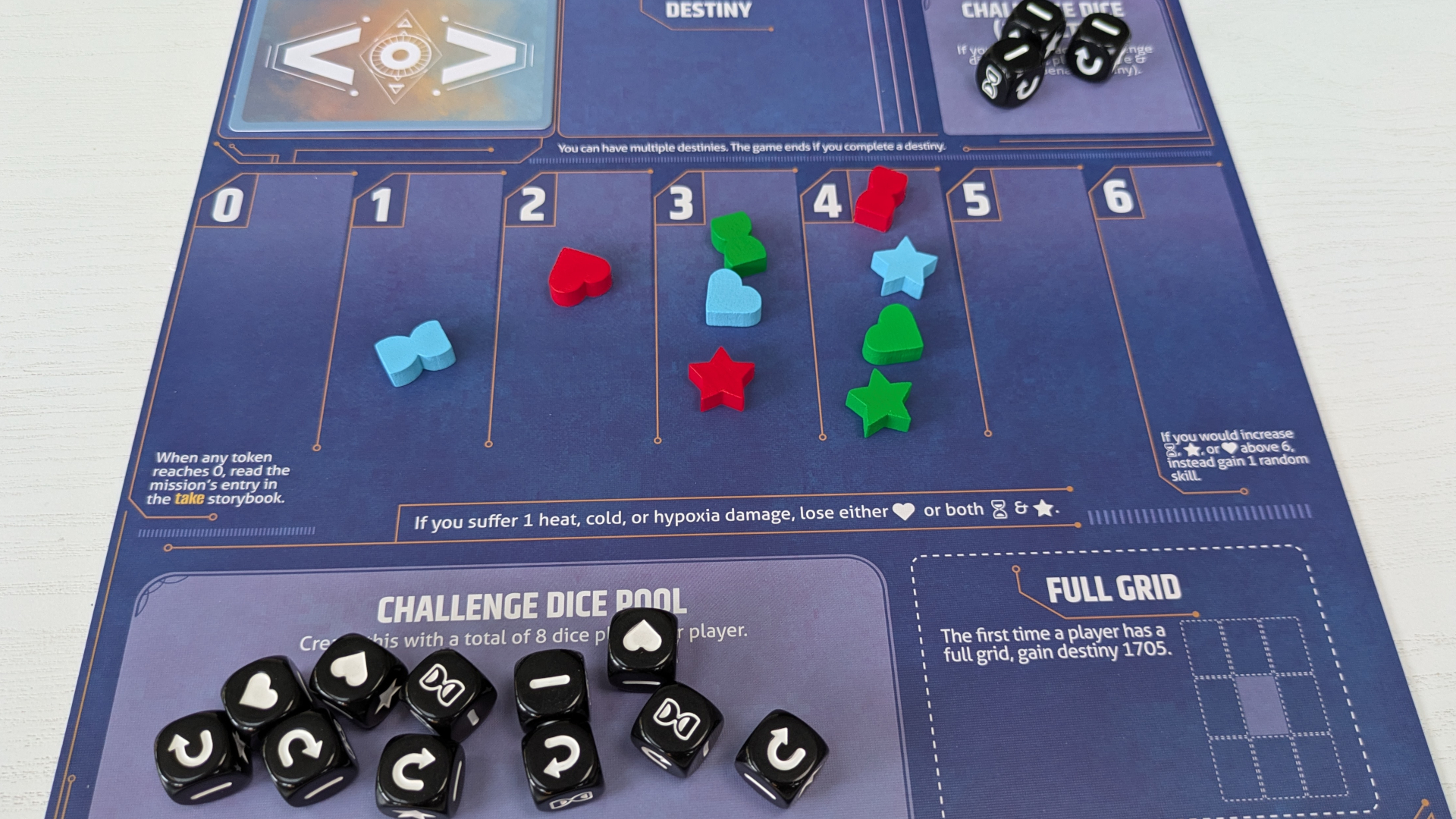
This review was conducted using a sample provided by the publisher.
Our reviewer (who has covered tabletop games in a professional capacity for years) first made sure to analyze the rules and examine the components of Vantage to get a feel for the game. Because repeat play is a crucial part of Vantage, they took part in full sessions that helped them better understand its longevity, not to mention how those systems hold up under different circumstances.
For a better understanding of our procedure, be sure to check this guide to how we test board games or the wider GamesRadar+ reviews policy.
Looking for other recommendations? Swing by the best family board games, or the best adult board games.

Matt is a freelance writer specialising in board games and tabletop. With over a decade of reviews under his belt, he has racked up credits including IGN, Dicebreaker, T3, and The Guardian.
You must confirm your public display name before commenting
Please logout and then login again, you will then be prompted to enter your display name.
